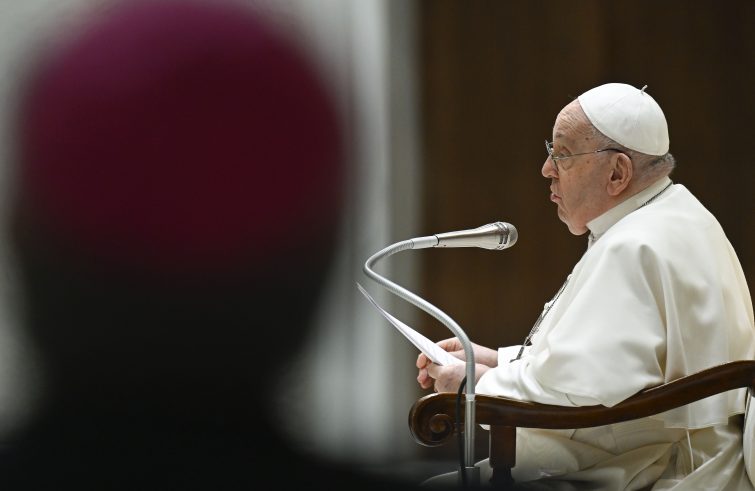
“Wrath is a pervasive vice. It is a particularly dark vice, a vice that destroys human relationships”, Pope Francis said in his weekly catechesis at the General Audience in Paul VI Hall, focused on the vice of wrath, which, “in its most acute manifestation, concedes no respite.” In the final greetings to the Italian-speaking faithful, the Pope mentioned the National Civilian War Victims Day, to be celebrated tomorrow.
“May our prayers, in memory of the many who died in the two world wars, also remember the many – too many – civilians, defenceless victims of the wars that unfortunately still stain our planet with blood, as is the case in the Middle East and in Ukraine,” the appeal reads: “May their cry of suffering touch the hearts of national leaders and inspire plans for peace.” “In the news of these days we read of so much cruelty, so much,” the Pope added: “Let us ask the Lord for peace, which is always gentle, never harsh.”
The Pope went on to describe: “The person dominated by wrath finds it difficult to hide this impulse: you can recognize it from the movements of his body, his aggressiveness, his laboured breathing, his grim and frowning expression. In its most acute manifestation, wrath is a vice that concedes no respite. If it is born of an injustice suffered (or believed to be suffered), often it is unleashed not against the offender, but against the first unfortunate victim. There are men who withhold their rage in the workplace, showing themselves to be calm and composed, but at home they become unbearable for the wife and children.”
“Wrath is a vice that destroys human relationships”,
the Pope explained: “It expresses the incapacity to accept the diversity of others, especially when their life choices diverge from our own. It does not stop at the misconduct of one person, but throws everything into the cauldron: it is the other person, the other as he or she is, the other as such, who provokes anger and resentment. One begins to detest the tone of their voice, their trivial everyday gestures, their ways of reasoning and feeling.” “When the relationship arrives at this level of degeneration, lucidity is lost”, Francis warned: “Wrath makes us lose lucidity, because one of the characteristics of wrath, at times, is that sometimes it fails to mitigate with time. In these cases, even distance and silence, instead of easing the burden of mistakes, magnifies them. For this reason, the Apostle Paul – as we have heard – recommends to Christians to face up to the problem straight away, and to attempt reconciliation: “Do not let the sun go down on your anger”.
“We are all sinners, all of us, and we all have accounts to settle”,
the Pope said: “and therefore we all need to learn how to forgive.” The Pope’s recommendation with regard to the onset of wrath: “It is important that everything dissipate immediately, before sundown. If some misunderstanding arises during the day, and two people can no longer understand each other, perceiving themselves as far apart,
the night cannot be handed over to the devil.”
The vice would keep us awake at night, brooding over our reasons and the unaccountable mistakes that are never ours and always the other’s.” “It is like that”, Francis remarked off text, “when a person is enraged, they always, always say that the other person is the problem. They are never capable of recognizing their own defects, their own shortcomings.” “In the Lord’s prayer, Jesus makes us pray for our human relations, which are a minefield: a plane that is never in perfect equilibrium”, the Pope pointed out: “In life, we have to deal with trespassers who are in fault with us, just as we have never loved everyone in the right measure. To some we have not returned the love that was due to them.” “Men do not stay together if they do not also practice the art of forgiveness, as far as this is humanly possible”, Francis assured. He said: “Wrath is countered by benevolence, openness of heart, meekness and patience.
“But not everything that stems from wrath is mistaken”,
the Pope said in the concluding lines of the catechesis:
“If a person were never to anger, if a person did not become indignant at an injustice, if he did not feel something quivering in his gut at the oppression of the weak, it would mean that the person was not human, must less a Christian.”
Wrath “is a terrible vice, that is at the origin of wars and violence”, Francis reiterated, mentioning the the Proem of the Iliad that describes “the wrath of Achilles”, which was to be the cause of “infinite woes.” “The ancients understood well that there exists an irascible part of us that cannot and must not be denied”: “The passions are to some extent unconscious: they happen, they are life experiences. We are not responsible for the onset of wrath, but always for its development. And at times it is good for anger to be vented in the right way.”
“Holy indignation exists, which is not wrath but an inner movement,”
the Pope noted: “Jesus knew it several times in His life (cf. Mk 3.5): He never responded to evil with evil, but in His soul, He felt this sentiment, and in the case of the merchants in the Temple, He performed a strong and prophetic action, dictated not by wrath, but by zeal for the house of the Lord.” “We must distinguish”, the Pope concluded in unscripted remarks: “well: zeal, holy indignation, is one thing; wrath, which is bad, is another. It is up to us, with the help of the Holy Spirit, to find the right measure for the passions. To educate them well so that they turn to good and not to evil.”











